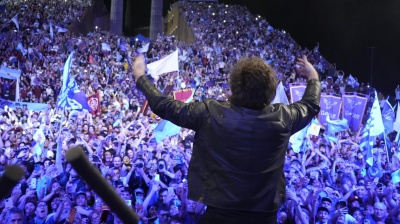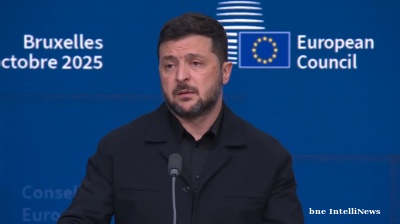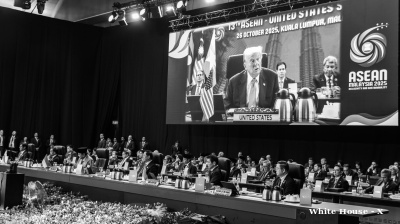Chaos and violence erupted in Tbilisi on September 8 when supporters of the Georgian Dream (GD) government attacked anti-government protesters outside the campaign headquarters of Tbilisi Mayor Kakha Kaladze.
The office has been a site of tense standoffs between protesters and GD loyalists since it opened on September 2, weeks away from Georgia’s October 4 local election.
Kaladze, GD’s candidate, will seek to secure a fourth term as mayor.
More than a dozen people, including journalists, were injured after exchanges of verbal insults between protesters and GD supporters escalated into violent brawls on the evening of September 8.
Though police were mobilised on the scene, no arrests were made, raising questions about government supporters’ freedom to act with impunity, whilst dozens of demonstrators have been handed prison sentences in recent weeks for minor, protest-related offences.
Media footage from the scene showed GD supporters – some with their faces covered and some wearing ruling party-branded t-shirts – repeatedly punching demonstrators who had arrived at the campaign office during their nightly march from the Georgian Public Broadcaster to the parliament.
According to local outlet Civil.ge, ruling party supporters were waiting for the protesters in parked cars, while others came out of the campaign HQ.
Some of the attackers beat protesters brutally with rubber batons, while others hurled metal barriers into the crowd.
Footage depicts a police officer confiscating one man’s rubber baton and placing it in a police car. The assailant, who can be heard telling the officer he was a GD supporter, was not arrested, despite having beaten a protester with the baton minutes before.
Journalists were targeted. Hungarian journalist László Róbert Mézes was hospitalised with lacerations to the face and a broken finger, and also had his phone snatched.
Local opposition-aligned outlet Publika issued a statement on the clashes, claiming GD supporters attacked two of its journalists – Keto Mikadze and Alexander Keshelashvili – and stole their mobile phones.
According to JamNews, Georgia’s opposition claimed the attackers were members of GD’s youth wing, while other outlets are using the term “titushky”, a term for government-hired assailants.
The Georgian Ministry for Internal Affairs has announced that it has opened an investigation into “violence or threats of violence during pre-election campaign or campaigning events”.
The ministry said that the case has been opened off the back of a complaint lodged by members of the ruling party and urged protesters to act within the law, warning that police would otherwise take measures against them.
Further, the ministry noted that the police “took all relevant measures from the start of the confrontation to cool down the tensions and prevent the further intensifying of the conflict”.
On being shown video footage of several female demonstrators being attacked, Kaladze denied any evidence of violence against women.
“Where do you see women here? Not one of them is a woman, they are some other species. Show me who among them is a woman,” Kaladze said, as reported by Formula TV.
Bizarrely, the mayor instead likened the female rally participants to “Akatsuki”, a gang of vigilante ninjas from the Naruto manga who unite with the aim to control the world via hypnosis.
The GD parliament speaker, Shalva Papuashvili, meanwhile, stated the incident was a “clear example of external interference” aimed at creating a hostile environment prior to the October local vote.
Papuashvili alleged the protesters were extremist “encouraged by certain foreign diplomats” and “funded from abroad”, as reported by JamNews.
The ruling party continues to doggedly accuse subversive “external forces” – the so-called “Global War Party” or “deep state” – of attempting to interfere in domestic politics and open a second front of the Russia-Ukraine war on Georgian soil.
On the evening of September 9, protesters again gathered outside the GD election HQ, and though government supporters jeered at them from inside the building, no clashes were reported.
However, the police announced an investigation had been launched into anti-government inscriptions graffitied on a Kaladze campaign banner, an offence punishable by up to three years in prison.
News

Milei celebrates resounding victory in Argentina's midterm elections
Argentine President Javier Milei scored a major win for his La Libertad Avanza (LLA) party in Argentina's October 26 midterm legislative elections, as the party obtained approximately 40.84% of the nationwide vote with 99.14% of the votes counted.

Zelenskiy accuses China of aiding Russia’s war effort through industrial and military support
Ukrainian President Volodymyr Zelenskiy accused China of materially supporting Russia’s military-industrial complex, providing key technologies and resources that have enabled Moscow to sustain and scale its war effort against Ukraine.

US Treasury Secretary Bessent blasts “Russian propagandist” special envoy Dmitriev in Washington PR debacle
A trip to Washington by the Kremlin’s special business envoy Kirill Dmitriev days after the US imposed new oil sanctions turned into a debacle after US Treasury Secretary Scott Bessent blasted him as a “Russian propagandist.”

Trump pledges enduring support for Southeast Asia as new trade deals signed
During his visit to Southeast Asia, US President Donald Trump declared that Washington would remain a steadfast ally to the region, as he signed a series of trade agreements with four ASEAN member states.




